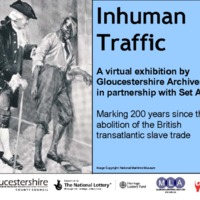
Inhuman Traffic
The Inhuman Traffic project was led by Gloucestershire Archives, in partnership with the Set All Free initiative. The virtual exhibition and accompanying web resource were based on documents held at Gloucestershire Archives and, in particular, the papers of the anti-slavery campaigner Granville Sharp (1735-1813). The exhibition explored topics such as the contribution of black people to the abolition movement, aspects of the legacies of slavery, including racism and domestic violence. Over 400 copies of the exhibition DVD were sent to schools, churches, tourist information venues and individuals across Gloucestershire. The associated programme of events included performances of the play 'Inhuman Traffic', developed in collaboration with a local theatre company, Spaniel in the Works. The play features four interacting characters with different perspectives on slavery. A cross-curricular teaching resource was later developed, which included a second performance, 'Master and Slave', in partnership with Stroud District Museums Service, Spaniel in the Works, and Parliament Primary School, Stroud.
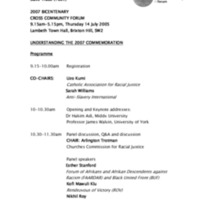
2007 Bicentenary Cross-Community Forum
The main aim of the 2007 Bicentenary Cross-Community Forum (2007BCCF) was to facilitate space for dialogue and alliance building in areas of work connected to the legacies of enslavement, related global injustices today and contemporary forms of slavery. The forum was jointly convened by Rendezvous of Victory, Anti-Slavery International and the World Development Movement. The education initiative aimed to assist in discussion and alliance-building on issues arising from the legacies of African Enslavement such as Maangamizi (Afrikan Holocaust) Awareness, Afriphobia, reparations, global injustices today and contemporary forms of enslavement. Open meetings were held in London between 2005 and 2007, and the group produced the 2007 Cross-community e-bulletin three times a year, including comment pieces about the significance of 2007. Task Action Groups were set up, such as the Cross-Community Dialogue Action Group on Education (CCODAGE), jointly hosted by the Council for Education in World Citizenship and the School of Education at Kingston University. A Global Justice Forum was developed out of the 2007BCCF in order to advance work beyond 2007.
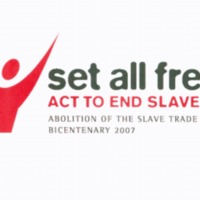
Set All Free: ACT TO END SLAVERY
Set All Free: ACT TO END SLAVERY was a project of Churches Together in England, based in London. It was also a collaboration between church-related groups, societies and organisations around the UK working together with a Christian ethos to assess the relevance of the bicentenary, and in particular the legacies of slavery. The project aimed to highlight how the values of the abolitionists can transform relationships on an individual, community and society level. The project included building a network coalition, campaigning, producing research and resources for churches, schools and individuals. Set All Free also worked closely with Anti-Slavery International and Rendezvous of Victory, a leading African community-led organisation.

Splendid Mummer
A play by Lonne Elder, 'Splendid Mummer' looks at the life of Ira Aldridge (1807-1867), the goundbreaking 19th century actor. Aldridge overcame racism and prejudice in European theatres to break away from stereotypical comedy roles and become one of the first Black Shakespearean actors. In 2007, the play was presented by CETTIE (a London charity working with schools, libraries, theatres, and community venues), directed by Malcolm Frederick, and starred Shango Baku. It was performed in various venues in London and at The Drum in Birmingham, and was accompanied by a feature exhibition on Aldridge by Positive Steps. 'Splendid Mummer' was produced in collaboration with the Ira Aldridge Bicentenary Project.
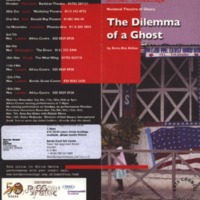
The Dilemma of a Ghost
Written by Ghanaian playwright Ama Ata Aidoo, The Dilemma of a Ghost deals with colliding cultures in 21st century Africa. An African-American woman accompanies her Ghanaian husband as he returns home, but the couple are haunted by ghosts of the inheritance of the slave trade. A collaboration between London theatre company Border Crossings and the National Theatre of Ghana, the production used music and dance to celebrate 50 years of Ghana’s independence and 200 years since the abolition of the transatlantic slave trade. The play was performed in Birmingham, Hull, Leeds, Leicester, London, Plymouth and Slough. The production was was accompanied by a new book from Border Crossings, working in collaboration with Anti-Slavery International. ‘Theatre and Slavery: Ghosts at the Crossroads’ explored the ways in which world theatre responds to key issues in modern society and politics, including the issue of contemporary slavery.
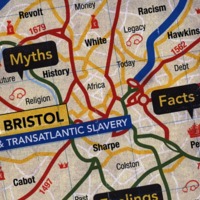
Myths, Facts, Feelings: Bristol and Transatlantic Slavery
The project to produce the booklet Myths, Facts and Feelings: Bristol and Transatlantic Slavery began in 2007. The Bristol Race Forum aimed to tackle some of the sensitivities, misunderstandings and popular opinions about the subject, and particularly in the Bristol area. The book's development went through a number of stages until it was published in 2012. The booklet and accompanying website for schools and communities across Bristol were produced with a view to sharing lessons from Bristol's past, and as a driver for future debate, activism and challenging prejudices. The contents were developed out of workshops with young people from the African Caribbean community and visits to community groups across Bristol.
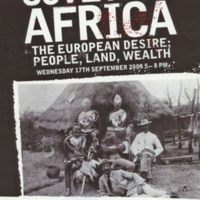
Coveting Africa. The European Desire: People, Land, Wealth
Bishop’s Stortford was the birthplace of the Victorian financier and imperialist Cecil Rhodes. To commemorate the bicentenary of the Abolition Act, Bishop's Stortford Museum and Rhodes Art Complex explored Britain’s imperial ambitions in the ‘Coveting Africa’ exhibition. The museum holds much material from Southern Africa, Zimbabwe, Zambia and Botswana: areas where British colonialism and imperialism in Africa was focused in the nineteenth century. Through a year-long programme of arts events, this project discussed the relationship between Britain and Africa, and explored British attitudes to African peoples. Events included workshops by the London School of Capoeira.
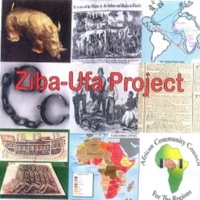
Ziba-Ufa
The phrase 'Ziba-Ufa' is Kiswahili for 'Closing the Gap'. Led by ACCR - the African Community Council for the Regions - this project aimed to close the gap between past and present by undertaking research from an African perspective. Blind Memory was a multimedia exhibition of images of Africa, slavery and resistance held at the Drum Arts Centre in Birmingham. The exhibition looked at memories relating to the transatlantic slave trade and how they affect beliefs and feelings; one of the aims of the exhibition was to rectify the amnesia and blind memory which many people are perceived to have in relation to slavery.
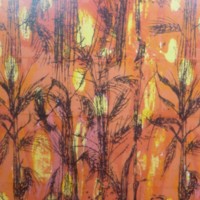
Trade and Empire: Remembering Slavery
The Whitworth Art Gallery was one of eight heritage bodies in the ‘Revealing Histories: Remembering Slavery’ partnership in Greater Manchester. The project set out to explore the history, impact and legacy of slavery on Britain through collections and community links in the North West.
'Trade and Empire: Remembering Slavery' explored the themes of trade and empire, commerce and collecting, and the impact of the experience of slavery and its legacy. Four invited artists and academics (SuAndi, Kevin Dalton-Johnson, Dr Emma Poulter and Dr Alan Rice) worked with Whitworth curators and learning staff to create the exhibition. It comprised of selections from the Whitworth's collections, contemporary works by Black artists, and objects on loan from Manchester Museum, John Rylands University Library Manchester, Bolton Museums and Archives Service and private collections. Areas of focus included a history of the Benin Bronzes, representations of Black people in British art, photographs of West Africa belonging to Tom Singleton Gardner, and printed textiles designed by Althea McNish. The exhibition was accompanied by a series of community engagement events.
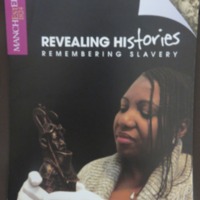
Revealing Histories: Remembering Slavery (The Manchester Museum)
The Manchester Museum was one of eight heritage bodies in the ‘Revealing Histories: Remembering Slavery’ partnership in Greater Manchester. The project set out to explore the history, impact and legacy of slavery on Britain through collections and community links in the North West.
The Manchester Museum examined the role of Victorian institutions in promoting the racist thinking that justified slavery; objects and images in the museum's collections were identified as having been used to support racist ideas. Events and workshops included a debate based on the question 'Are museums racist?', plus sessions on African dance traditions. 'This Accursed Thing' was a promenade performance around the museum, examining the transatlantic slave trade through the eyes of those involved - abolitionists and traders, slavers and slaves - and looking at ways in which individuals attempted to dispel racist myths. The 'Myths about Race' exhibition was the culmination of Manchester Museum's participation in the Revealing Histories project.
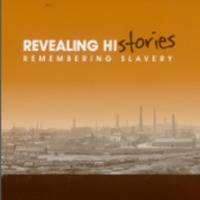
Revealing Histories: Remembering Slavery (Gallery Oldham)
Gallery Oldham was one of eight heritage bodies in the ‘Revealing Histories: Remembering Slavery’ partnership in Greater Manchester. The project set out to explore the history, impact and legacy of slavery on Britain through collections and community links in the North West.
A number of objects from Gallery Oldham's collections were identified as having links to the histories of the slave trade and slavery, focused on the themes of sugar, abolition, the American Civil War and the cotton industry. Two exhibitions also played a role in this trail. 'Cops and Bobbins', exploring Oldham's textile industry, illuminated the links with American slavery in the 19th century. 'Oldham Votes' looked at the significance of the election of 1832, during which slavery and abolition were debated. In collaboration with Touchstones Rochdale, Gallery Oldham also hosted a special day event, 'Slavery - what's it got to do with us?', featuring family activities, debate, and performances of African dance.
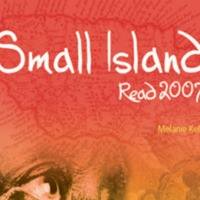
Small Island Read 2007
This community-based mass reading scheme drew together partners from four areas of the UK; Bristol and the South West (Great Reading Adventure), Liverpool and the North West (Liverpool Reads), Hull (Hull Libraries) and Glasgow (Aye Write! Bank of Scotland Book Festival). 50,000 free copies of Andrea Levy’s award-winning novel 'Small Island' were distributed - a story of Jamaican slave descendants arriving in the UK in the 1940s, it addressed resonant themes of identity, racial awareness, forgiveness, ignorance and survival. There was also an accompanying reader's guide. Younger audiences took part by reading Benjamin Zephaniah’s 'Refugee Boy', or Mary Hoffman’s 'Amazing Grace'. Activity packs inspired discussion of historic and contemporary issues addressed in the texts. Featured are some of the responses of pupils from Parson Street Primary School, Bristol, to 'Refugee Boy'.
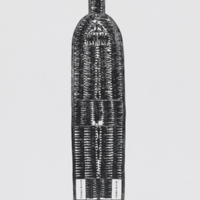
Absolut Power
This piece of art by Hank Willis Thomas is based on the Brookes slave ship image which was made famous by the British abolitionist campaign against transatlantic slavery. The artist said of the piece that “Racism is the most successful advertising campaign of all time... Africans have hundreds if not thousands of years of culture. Having all of these people packed into ships and then told they’re all the same, reducing them to a single identity—that’s absolute power.”